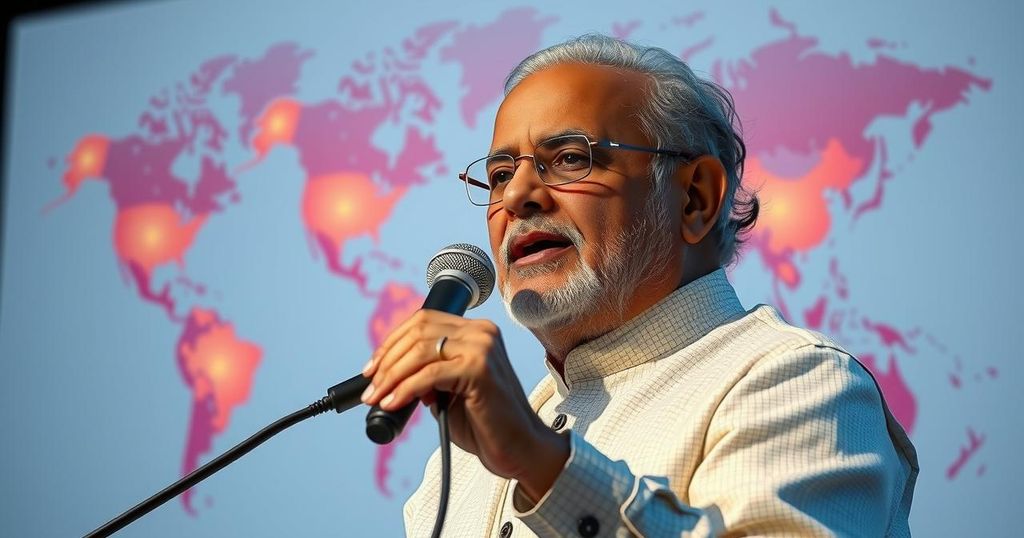PM Modi Calls on Indian Diaspora to Propel India’s Global Growth
Prime Minister Narendra Modi urged the Indian diaspora in Kuwait to support India’s transformation into a developed nation by 2047, focusing on innovation and green energy. He emphasized the importance of collaboration with Kuwait and highlighted the contributions of the Indian community in various sectors while advocating for skilled Indian migration opportunities. Modi’s visit underscored his commitment to Indian workers abroad and indicated strong bilateral ties.
During a significant event in Kuwait, Prime Minister Narendra Modi called upon the Indian diaspora to contribute to India’s transformation into a developed nation by the year 2047. He underscored India’s emerging role as a global center for innovation and sustainability, particularly in green energy and electronics. In his address at the “Hala Modi” event, he emphasized the need for collaboration with Kuwait, leveraging the longstanding ties between the two nations as a foundation for future endeavors.
While acknowledging the contributions of the one million-strong Indian community in Kuwait, he noted their vital roles in education and infrastructure development. Modi highlighted India’s potential to meet global demands for skilled labor, pointing to agreements with numerous countries that open doors for Indian professionals, particularly in skilled sectors. He remarked, “The developed countries are opening their doors for skilled Indian manpower,” illustrating the increasing opportunities available to Indians overseas.
Modi also discussed India’s remarkable economic growth and expanding stature in technology, stating that it is now the fifth largest economy globally. He asserted that India’s goal of becoming a “Viksit Bharat” aligns with Kuwait’s aspirations under its “New Kuwait” policy, offering numerous possibilities for mutually beneficial cooperation.
During his visit, he took the time to engage with Indian laborers residing in Kuwait, further reflecting his commitment to the welfare of expatriate workers. Additionally, he honored individuals who have played a significant role in promoting Indian culture in the Arab world. Modi’s interactions with these esteemed members of the Indian community showcased the rich cultural exchanges facilitated by the Indian diaspora.
In summary, Prime Minister Modi’s visit and his address reaffirm the importance of the Indian diaspora in driving India’s progress towards its 2047 vision. By emphasizing innovation, collaboration, and cultural connectivity, he shared his optimism about India’s future as a global leader in various sectors.
The prompt highlights Prime Minister Narendra Modi’s strong appeal to the Indian diaspora during a visit to Kuwait. This audience has significant representation in the Middle East and plays a crucial role in fostering India’s international relationships. The call to action emphasizes India’s potential to emerge as a developed nation by 2047, framed within the context of historical ties with Kuwait and the diaspora’s contributions to India’s growth. Modi’s visit reflects a broader strategy to strengthen international cooperation and respond to labor needs worldwide, as well as to ensure the welfare of Indian workers abroad.
Prime Minister Narendra Modi’s address underscored the critical role of the Indian diaspora in India’s aspirations for development by 2047. His emphasis on collaboration, innovation, and cultural exchange lays the groundwork for a future-focused partnership with Kuwait. By recognizing the Indian community’s contributions, Modi not only affirmed their significance in the global workforce but also highlighted India’s ambition to become a leader in various sectors on the world stage. His proactive measures and engagements during the visit furthermore reflect a deep commitment to the welfare and acknowledgment of expatriate communities, which is vital for India’s growth trajectory.
Original Source: www.hindustantimes.com




Post Comment